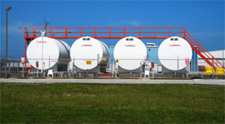FAA and Industry Working Together On Alternative Aviation Fuels
 The FAA is collaborating very closely with the aviation industry and two leading unleaded fuel developers, General Aviation Modifications Inc. (GAMI) and Swift Enterprises, to develop policies, methods, and specifications to facilitate the introduction of alternative aviation fuels using the ASTM International specification development process.
The FAA is collaborating very closely with the aviation industry and two leading unleaded fuel developers, General Aviation Modifications Inc. (GAMI) and Swift Enterprises, to develop policies, methods, and specifications to facilitate the introduction of alternative aviation fuels using the ASTM International specification development process.
ASTM International, originally known as the American Society for Testing and Materials (ASTM), is an organization that develops standards and specifications for many industrial and engineering products, including aviation fuels.
The FAA is also focusing significant resources on an alternative to this consensus-based process. This alternative approach allows the approval of an aviation fuel operating limitation using a compliance method that provides an equivalent level of safety to that provided by the ASTM aviation fuel specification development process. This compliance concept is predicated on compositional control of the fuel and will require a rigorous evaluation of the fuel performance.
General Aviation Modifications Inc. (GAMI) has requested to use this alternative approach in parallel to obtaining ASTM specification approval for their unleaded fuel. GAMI has requested an STC approval for use of G100UL fuel on Teledyne Continental Motors IO-550-N engines that are modified with a turbonormalizer. While the STC approval will be limited to the IO-550-N engine installed in the Cirrus SR22 airplane, it is expected that the ASTM specification will have broader applicability.
A two-day technical meeting was held at GAMI's facility in Ada, OK. In attendance were members from the FAA Engine and Propeller Directorate, the Aircraft Certification Office responsible for GAMI's certification projects and representatives from the FAA William J. Hughes Technical Center. Attendee's toured the facility and discussed the technical and regulatory aspects of this alternative approach. GAMI plans to work with FAA to develop a detailed compliance plan for the G100UL fuel.
Since 2005, Swift Enterprises has also been developing an unleaded high octane aviation gasoline designed to meet or exceed the operational parameters of conventional, leaded aviation gasoline. Through industry consensus and direction, Swift has developed a test specification for their fuel, called UL102, and has generated the necessary research and development data over these last five years to support that specification. Swift is currently in the final stages of balloting the test specification and supporting data to the ASTM International membership for final approval and issuance.
During an FAA visit to Swift's facilities in West Lafayette, IN, Swift said they have received a tremendous amount of knowledge and support from the ASTM community since joining in 2007. From the Swift perspective, advantages of the ASTM process include access to knowledge and support from established aviation fuel producers, distributors, and aircraft and engine manufacturers, and an organized structure for collaboration. The ASTM process also provides a proven method by which complex issues are worked out before products reach the fleets. While the ASTM process may be perceived as slow, it brings into one open forum expertise from all areas of the aviation fuel community to anticipate problems before they are realized in the field. According to Swift, a fully adjudicated and approved ASTM specification ensures consistency, safety, and quality control for the specified products.
Last updated: Thursday, November 04, 2021
